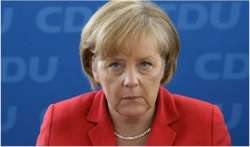Major powers in UNSC must put aside differences to adopt COVID-19 resolution: Germany
In an apparent reference to the US and China, Germany has said “major powers” in the UN Security Council must put aside differences that have so far prevented the adoption of a resolution on the COVID-19 pandemic. Led by Germany, nine of the Security Council's 10 non-permanent members had requested a meeting to discuss the coronavirus crisis last week.

In an apparent reference to the US and China, Germany has said “major powers” in the UN Security Council must put aside differences that have so far prevented the adoption of a resolution on the COVID-19 pandemic. Led by Germany, nine of the Security Council's 10 non-permanent members had requested a meeting to discuss the coronavirus crisis last week. The Council met for the first time to discuss the pandemic on April 9.
Germany’s Foreign Minister Heiko Maas said in a statement on Friday that Council meeting on COVID-19 is “an important step and an encouraging sign. We can only overcome this crisis by acting together and in solidarity. To do this, we need strong United Nations and a strong Security Council.”
Efforts to discuss the coronavirus situation in the Council were stalled till now mainly due to the stalemate between Washington and Beijing.
The Council’s two veto-wielding permanent members have been arguing over the origins of the virus and how any possible Council statement or resolution should reflect that.
Making an apparent reference to the US and China, Maas said, “The major powers in the Security Council must also put aside the differences that have so far prevented the adoption of a resolution.”
He underscored that the Security Council must also fulfil its responsibility in addressing the pandemic and its impacts on the existing crises and conflicts around the world.
Citing the situation in Syria and Libya, he said a pandemic like COVID-19 exacerbates existing conflicts and has the potential to further destabilise already fragile states and regions.
“It is therefore crucial that we, the international community, respond to this crisis by working together.”
Maas also called for the Security Council to finally fully endorse the Secretary-General's call for a global ceasefire.
“We are working hard, alongside the other elected members of the Security Council, to make sure this happens,” he said.
Following the Council meeting on Thursday, UN Director at the International Crisis Group, a non-governmental organisation focussed on preventing conflict, Richard Gowan had told PTI the Security Council still seems unable to measure up to the scale of the COVID-19 crisis.
He said there is a sense that China and the US in particular are more keen on scoring political points against one another in New York than throwing their united weight behind common action on the crisis.
“COVID-19 has laid bare the lack of trust among Council members all too acutely,” he said.
“We must hope that the big powers gradually grasp that such a severe global threat demands a multilateral response.
Most of the elected members of the Council feel that it is essential to do more. India, preparing for its own stint on the council starting next year, should throw its weight behind the elected members' efforts to address this situation,” Gowan said.
Germany, a non-permanent member of the Council, will hold the Presidency of the 15-nation UN arm in July and will use the month to help create conditions for the Council to track the potential impacts of health crises on security early and systematically, Maas said.
Maas also made a reference to the criticism of the World Health Organisation (WHO), which has come under attack from US President Donald Trump who has said he will put a "very powerful hold” on the money it gives to WHO.
The German foreign minister said while criticism must be allowed, it should be constructive.
“We currently need more international coordination, not less. The WHO has an indispensable role to play in tackling this pandemic,” he said.
The aim of the international community now must be to strengthen and support the organisation and ultimately to ensure it is even better equipped to deal with the challenges of the future, he said, adding, "criticism must always be allowed, but it must be constructive."